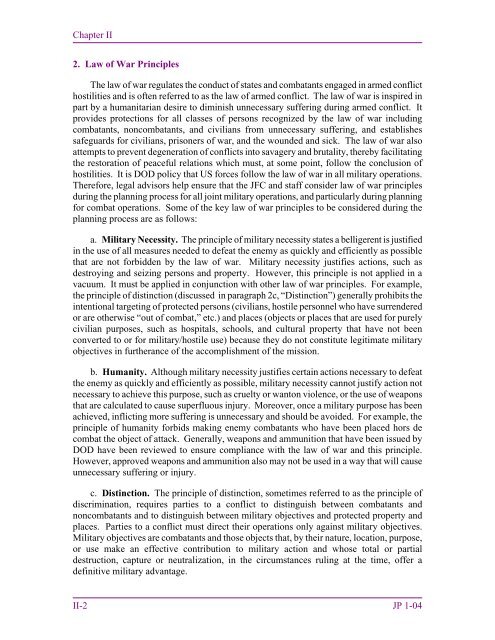Operations
jp1_04
jp1_04
You also want an ePaper? Increase the reach of your titles
YUMPU automatically turns print PDFs into web optimized ePapers that Google loves.
Chapter II<br />
2. Law of War Principles<br />
The law of war regulates the conduct of states and combatants engaged in armed conflict<br />
hostilities and is often referred to as the law of armed conflict. The law of war is inspired in<br />
part by a humanitarian desire to diminish unnecessary suffering during armed conflict. It<br />
provides protections for all classes of persons recognized by the law of war including<br />
combatants, noncombatants, and civilians from unnecessary suffering, and establishes<br />
safeguards for civilians, prisoners of war, and the wounded and sick. The law of war also<br />
attempts to prevent degeneration of conflicts into savagery and brutality, thereby facilitating<br />
the restoration of peaceful relations which must, at some point, follow the conclusion of<br />
hostilities. It is DOD policy that US forces follow the law of war in all military operations.<br />
Therefore, legal advisors help ensure that the JFC and staff consider law of war principles<br />
during the planning process for all joint military operations, and particularly during planning<br />
for combat operations. Some of the key law of war principles to be considered during the<br />
planning process are as follows:<br />
a. Military Necessity. The principle of military necessity states a belligerent is justified<br />
in the use of all measures needed to defeat the enemy as quickly and efficiently as possible<br />
that are not forbidden by the law of war. Military necessity justifies actions, such as<br />
destroying and seizing persons and property. However, this principle is not applied in a<br />
vacuum. It must be applied in conjunction with other law of war principles. For example,<br />
the principle of distinction (discussed in paragraph 2c, “Distinction”) generally prohibits the<br />
intentional targeting of protected persons (civilians, hostile personnel who have surrendered<br />
or are otherwise “out of combat,” etc.) and places (objects or places that are used for purely<br />
civilian purposes, such as hospitals, schools, and cultural property that have not been<br />
converted to or for military/hostile use) because they do not constitute legitimate military<br />
objectives in furtherance of the accomplishment of the mission.<br />
b. Humanity. Although military necessity justifies certain actions necessary to defeat<br />
the enemy as quickly and efficiently as possible, military necessity cannot justify action not<br />
necessary to achieve this purpose, such as cruelty or wanton violence, or the use of weapons<br />
that are calculated to cause superfluous injury. Moreover, once a military purpose has been<br />
achieved, inflicting more suffering is unnecessary and should be avoided. For example, the<br />
principle of humanity forbids making enemy combatants who have been placed hors de<br />
combat the object of attack. Generally, weapons and ammunition that have been issued by<br />
DOD have been reviewed to ensure compliance with the law of war and this principle.<br />
However, approved weapons and ammunition also may not be used in a way that will cause<br />
unnecessary suffering or injury.<br />
c. Distinction. The principle of distinction, sometimes referred to as the principle of<br />
discrimination, requires parties to a conflict to distinguish between combatants and<br />
noncombatants and to distinguish between military objectives and protected property and<br />
places. Parties to a conflict must direct their operations only against military objectives.<br />
Military objectives are combatants and those objects that, by their nature, location, purpose,<br />
or use make an effective contribution to military action and whose total or partial<br />
destruction, capture or neutralization, in the circumstances ruling at the time, offer a<br />
definitive military advantage.<br />
II-2 JP 1-04


